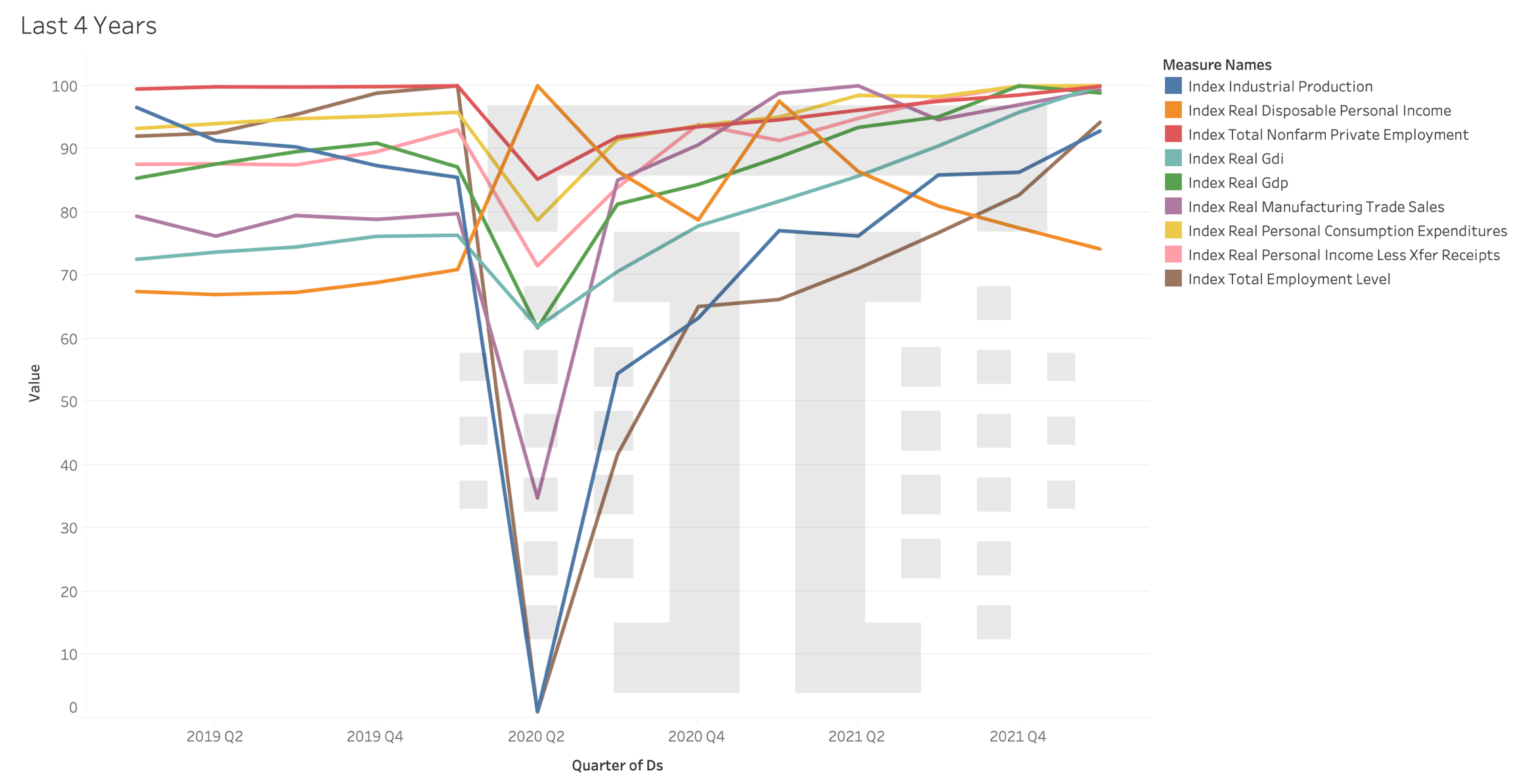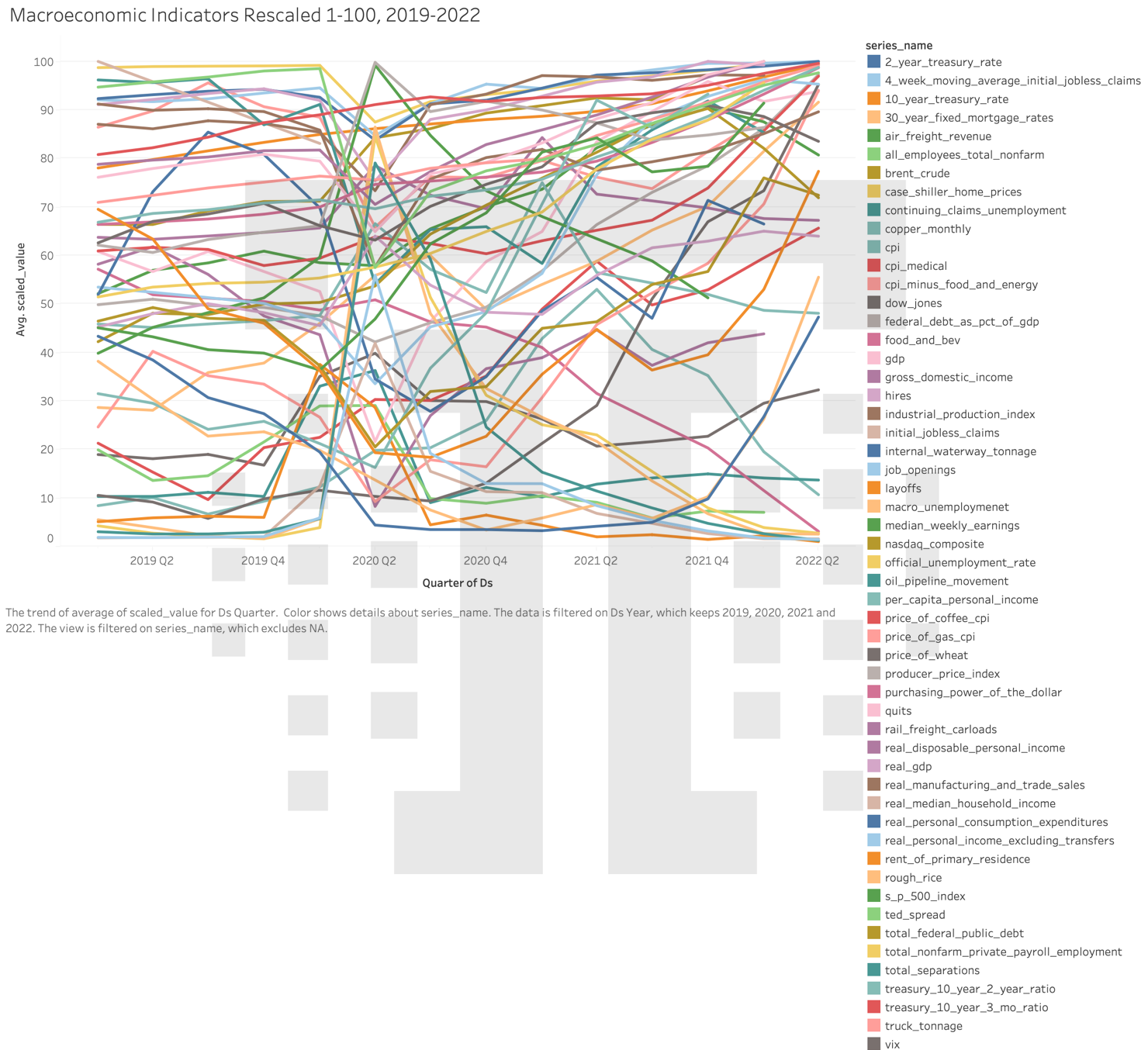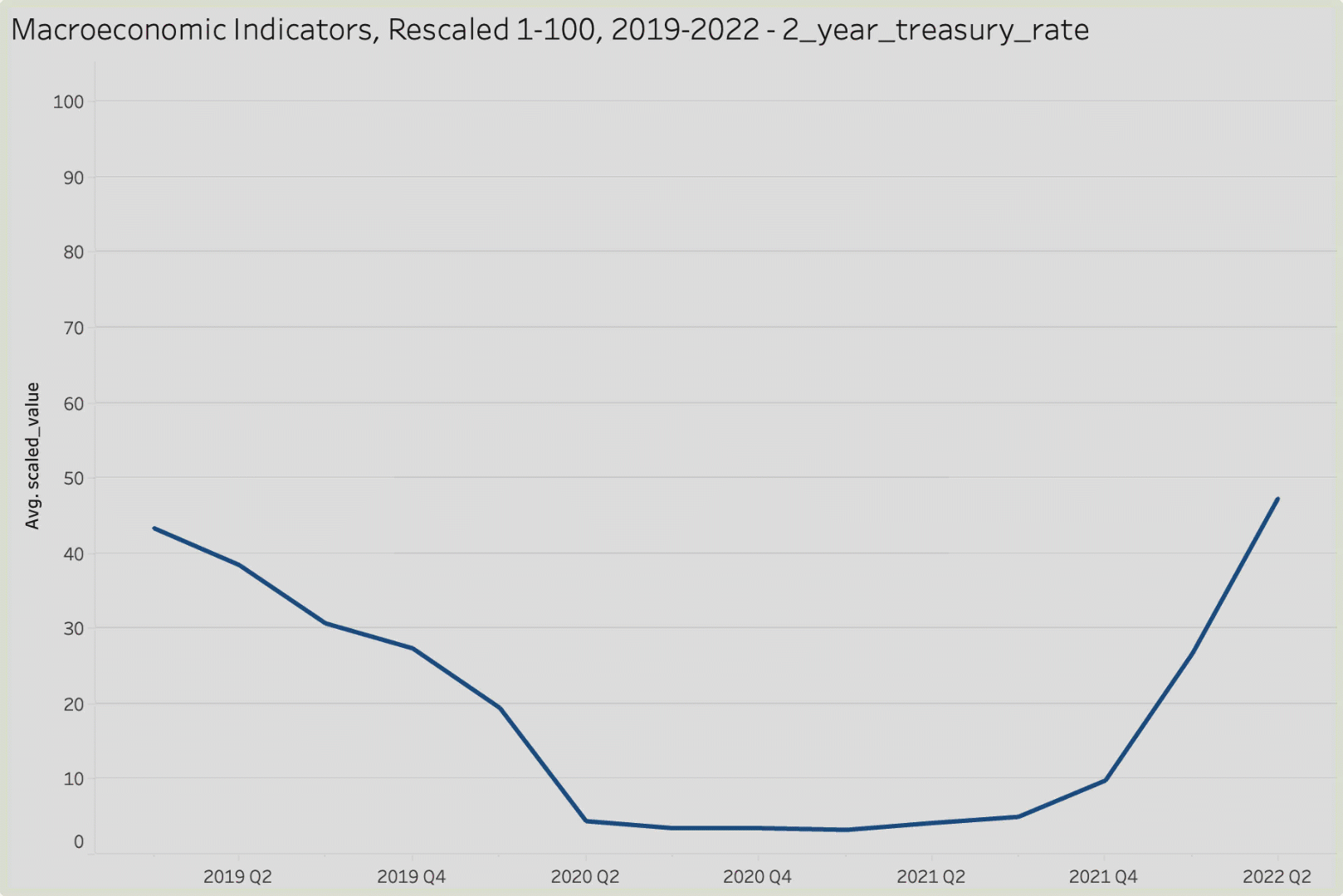INBOX INSIGHTS: Asking Better Interview Questions, Recession or No Recession (6/22) :: View in browser
Take our new Google Analytics 4 for Marketers Course »
One Click Poll!
Please click/tap on just one answer.
How likely are you to recommend Trust Insights as a consulting firm to a colleague in the next 90 days?
Asking Better Interview Questions
Last week I talked about pro tips for a hiring manager that is out of their depth. This week I want to focus on the rest of the interview.
Asking one good question isn’t going to cut it. You need to get to know your candidates and often, you have limited time to do so. You’re making a big decision based on a small sample of information. Candidates are trying to show you only the best of themselves. You might think you’re trying to figure out if the candidate is a culture fit by asking a quirky question. Or understand their critical thinking process by asking them how to fit a football field in a paper towel tube, but you’re wasting your time with these.
I asked our Slack Community what were some of the worst interview questions they’d heard and here is what they told me:
- Where do you see yourself in 5 years?” I said “Celebrating the 5th year anniversary of you asking this question”.
- “What is your biggest weakness?” questions, or the more abstract ones like “If you had an elephant, what would you do with it?”
- “What is your biggest weakness?” questions, or the more abstract ones like “If you had an elephant, what would you do with it?”
- “how many tennis balls can you fit in a school bus?”
- Why are manholes round? How much do you charge to wash every window in Seattle? How do you move Mount Fuji?
- “How many gas stations in America? How big is a baseball diamond?”
- “If you were a fruit, what fruit would you be and why?”
- “My first start-up asked me to explain what the company values meant to me using famous 90s hip hop songs.”
And of course – from Chris:
- “How do you deal with stress?” By punching people.
- “How do you handle strong personalities?” Also by punching people.
- “What’s your biggest weakness?” Honestly? My right hook.
- “How would you describe your work ethic?” I work and try to be as ethical as my employer will permit me. How ethical is your company?
- “Tell me about your previous positions.” That’s what the resume is for, dummy.
- “Tell me about yourself.” Well, I’m 5’3”, I like long walks down dark alleys, and I own more knives than you probably own shirts.
So – why are these questions a waste of time? Because you’re not getting to the heart of what you need to know. Yes, you need to know about the candidate’s experience. Yes, you want to determine if they might be a good culture fit. Yes, you want to know if they can problem solve. But bad questions like these tend to elicit bad answers. And then you’re stuck making decisions based on bad data. Which is bad.
If you want to figure out if someone would be a good culture fit, directly ask what their ideal working culture entails. Ask them what red flags they look for. Ask them what the culture was like at previous jobs and what they liked best and least. This will give you a better sense of whether they will be able to adapt to your culture.
If you want to see how someone solves problems, ask them about a real problem related to your business and the job function. “Our community engagement has gone down the past few months. How would you approach this problem to bring the numbers back up?” Show the candidate real data and ask them to come up with an action plan.
You can ask unconventional questions, but make sure they provide value to you. Bad questions lead to bad answers and bad decisions.
The questions you ask should help you decide who to hire. There will be time once you’ve made your hire to ask about someone’s favorite balloon animal.
Want to share your worst interview questions? Tell me in our Free Slack Group Analytics for Marketers.
– Katie Robbert, CEO

Do you have a colleague or friend who needs this newsletter? Send them this link to help them get their own copy:
https://www.trustinsights.ai/newsletter

In this week’s In-Ear Insights,Analytics is inherently rearward-looking, looking at what happened. Yet if we want to increase the value and impact of analytics, we have to look forward, to help plan. How do we do this? In this episode, learn 3 different approaches for improving the value of analytics.
Watch/listen to this episode of In-Ear Insights here »
Last week on So What? The Marketing Analytics and Insights Live show, we looked at UTM governance in Google Analytics 4. Catch the replay here »
This Thursday at 1 PM Eastern, we’ll be sharing how to master job interviews. Are you following our YouTube channel? If not, click/tap here to follow us!
Need a reminder? Click here for a calendar appointment:

Here’s some of our content from recent days that you might have missed. If you read something and enjoy it, please share it with a friend or colleague!
- Measuring your Net Promoter Score
- {PODCAST} In-Ear Insights: The Value of Professional Certifications
- Podcasting landscape overview
- Setting up basic data governance
- So What? UTM Governance in GA4
- INBOX INSIGHTS, June 15, 2022: Tips for Hiring Managers, The Great Reshuffling, Professional Certifications

Take your skills to the next level with our premium courses.
- New! Google Analytics 4 for Marketers – use discount code INBOXINSIGHTS for $50 off
- Google Search Console for Marketers – use discount code INBOXINSIGHTS for $50 off

Get skilled up with an assortment of our free, on-demand classes.
- How to Deliver Reports and Prove the ROI of your Agency
- Powering Up Your LinkedIn Profile (For Job Hunters)
- Competitive Social Media Analytics Strategy
- How to Prove Social Media ROI
- What, Why, How: Foundations of B2B Marketing Analytics

In this week’s Data Diaries, let’s shed some light on the question all over the news right now. Are the world’s various economies headed for a recession? Certainly, some economies like Ukraine’s are already deep in a recession for obvious reasons – being invaded will cause that.
The short answer: no, we’re not in a recession right now. But we might be headed that way. Let’s dig in.
One of the challenges of defining a recession is what constitutes an actual recession. In the USA, the National Bureau of Economic Research looks at 8 core measures to retroactively declare a period of time recessionary:
“The determination of the months of peaks and troughs is based on a range of monthly measures of aggregate real economic activity published by the federal statistical agencies. These include real personal income less transfers (PILT), nonfarm payroll employment, real personal consumption expenditures, wholesale-retail sales adjusted for price changes, employment as measured by the household survey, and industrial production.” (source)
These data points are available from the US Federal Reserve Bank. So, using these indicators, are we in a recession or headed for one? Let’s take a look at those indicators, rescaled so that they’re 1-100 values.

The short answer is that of the indicators the NBER uses to declare a recession, only real disposable personal income is down significantly so, from a technical perspective, we are not in a recession and as of right now we don’t appear to be headed for one.
Suppose we take a step back and look at the bigger picture, taking a much larger basket of economic measures. Let’s take 30 or so major economic indicators and rescale them as well:

Umm, it’s probably safe to say this visualization isn’t going to win any awards. But even in the tangled spaghetti, we can easily see the pandemic. Let’s take this apart and look at each indicator separately.

That’s much easier on the eyes. As the chart moves, you’ll note that most of the major indicators aren’t showing any huge warning signs. Hiring is leveling off, inflation is very high and climbing (which is a planet0wide issue), and other indicators don’t show any massive shocks to the system, especially when we look at 2020 in the mix. However, really big macro indicators like GDP are also leveling off, and GDP tends to level off for a quarter or two before a recession sets in.
Will inflation lead to a recession? Possibly. Very high costs slow things down; consumers and businesses alike curtail spending more as prices get higher – that’s economics 101. But right now the major economic indicators are showing mostly just inflation, and not the downstream effects of high inflation.
Inflation combined with tighter monetary policy probably will lead to a recession. How soon? Probably a couple of quarters, depending on how tight planetary monetary policy gets and how many other wild things happen on the world scene.
So what? What should you do with this information? As we talked about on the podcast this week, analytics is inherently rear-facing, like looking out the rear-view mirror of a car. If you’re concerned about where you might be going, looking at the data more frequently might lend some insights. While a lot of macroeconomic indicators are low frequency, published monthly, quarterly, or annually, it doesn’t hurt to keep an eye on the dataset as a whole, looking for early signs of a downturn.
Pay special attention to indicators in your vertical, like the hiring data we looked at last week. That will tell you much about your customers and your suppliers. Spotting a trend early in those data series will give you advanced notice about ripple effects and let you take action sooner.
As Katie mentioned in this week’s podcast episode, have a plan. Have three plans, really. Have a plan if things improve, if things stay the same, and if things get worse. Your plan should include concrete actions to take, like increasing or decreasing spend, banking or spending cash, purchasing or deferring purchases based on market conditions. That way, as you watch these indicators over time, if more start heading in the wrong direction, you can swap plans quickly and adapt – possibly before your competitors do.

- New! Case Study: Exploratory Data Analysis and Natural Language Processing
- Case Study: Google Analytics Audit and Attribution
- Case Study: Natural Language Processing
- Case Study: SEO Audit and Competitive Strategy

This is a roundup of the best content you and others have written and shared in the last week.
SEO, Google, and Paid Media
- You Ask, I Answer: SEO And Content Marketing?
- How to train entry-level SEO hires so they can contribute right away
- 11 SEO Myths That Will Damage Your Rankings in 2022 via BrightEdge
Social Media Marketing
- Could TikTok Be A Search Engine? For Many Users, It Already Is
- Where Nonprofits Spend Their Time On Social Media in 2022
- New Strategic Overview Points to Major Changes Coming to Your Facebook Feed via Social Media Today
Content Marketing
- You Ask, I Answer: Accessible and Inclusive Content?
- You Ask, I Answer: Content Awareness vs Consumption?
- You Ask, I Answer: Content Marketing and Web3?
Data Science and AI
- The truth about AI and ROI: Can artificial intelligence really deliver? via VentureBeat
- An AI Fix to Advertising Bias? Industry Giants Commit to IBM’s Tech
- Voicemod uses AI to transform your voice into Morgan Freeman, astronauts, and more via The Verge

Are you a member of our free Slack group, Analytics for Marketers? Join 2400+ like-minded marketers who care about data and measuring their success. Membership is free – join today. Members also receive sneak peeks of upcoming data, credible third-party studies we find and like, and much more. Join today!

We heard you loud and clear. On Slack, in surveys, at events, you’ve said you want one thing more than anything else: Google Analytics 4 training.
We heard you, and we’ve got you covered. The new Trust Insights Google Analytics 4 For Marketers Course is the comprehensive training solution that will get you up to speed thoroughly in Google Analytics 4.
What makes this different than other training courses?
- You’ll learn how Google Tag Manager and Google Data Studio form the essential companion pieces to Google Analytics 4, and how to use them all together
- You’ll learn how marketers specifically should use Google Analytics 4, including the new Explore Hub with real world applications and use cases
- You’ll learn how to determine if a migration was done correctly, and especially what things are likely to go wrong
- You’ll even learn how to hire (or be hired) for Google Analytics 4 talent specifically, not just general Google Analytics
- And finally, you’ll learn how to rearrange Google Analytics 4’s menus to be a lot more sensible because that bothers everyone
With more than 5 hours of content across 17 lessons, plus templates, spreadsheets, transcripts, and certificates of completion, you’ll master Google Analytics 4 in ways no other course can teach you.
As a valued Inbox Insights subscriber, use discount code INBOXINSIGHTS for $50 off. This expires on June 30, 2022.
Click/tap here to enroll today »

Where can you find Trust Insights face-to-face?
- MAICON, August 2022, Cleveland, OH – use code PENN150 for $150 off any conference ticket
- Content Marketing World, September 2022, Cleveland
- MarketingProfs B2B Forum, October 2022, Boston
Going to a conference we should know about? Reach out!
Want some private training at your company? Ask us!

First and most obvious – if you want to talk to us about something specific, especially something we can help with, hit up our contact form.
Where do you spend your time online? Chances are, we’re there too, and would enjoy sharing with you. Here’s where we are – see you there?
- Our blog
- Slack
- YouTube
- In-Ear Insights on Apple Podcasts
- In-Ear Insights on Google Podcasts
- In-Ear Insights on all other podcasting software

Our Featured Partners are companies we work with and promote because we love their stuff. If you’ve ever wondered how we do what we do behind the scenes, chances are we use the tools and skills of one of our partners to do it.
- Hubspot CRM
- StackAdapt Display Advertising
- Agorapulse Social Media Publishing
- WP Engine WordPress Hosting
- Techsmith Camtasia and Snagit Media Editing
- Talkwalker Media Monitoring
- Marketmuse Professional SEO software
- Gravity Forms WordPress Website Forms
- Otter AI transcription
- Semrush Search Engine Marketing
- Our recommended media production gear on Amazon
Read our disclosures statement for more details, but we’re also compensated by our partners if you buy something through us.

Some events and partners have purchased sponsorships in this newsletter and as a result, Trust Insights receives financial compensation for promoting them. Read our full disclosures statement on our website.

Thanks for subscribing and supporting us. Let us know if you want to see something different or have any feedback for us!
|
Need help with your marketing AI and analytics? |
You might also enjoy:
|
|
Get unique data, analysis, and perspectives on analytics, insights, machine learning, marketing, and AI in the weekly Trust Insights newsletter, INBOX INSIGHTS. Subscribe now for free; new issues every Wednesday! |
Want to learn more about data, analytics, and insights? Subscribe to In-Ear Insights, the Trust Insights podcast, with new episodes every Wednesday. |
Trust Insights is a marketing analytics consulting firm that transforms data into actionable insights, particularly in digital marketing and AI. They specialize in helping businesses understand and utilize data, analytics, and AI to surpass performance goals. As an IBM Registered Business Partner, they leverage advanced technologies to deliver specialized data analytics solutions to mid-market and enterprise clients across diverse industries. Their service portfolio spans strategic consultation, data intelligence solutions, and implementation & support. Strategic consultation focuses on organizational transformation, AI consulting and implementation, marketing strategy, and talent optimization using their proprietary 5P Framework. Data intelligence solutions offer measurement frameworks, predictive analytics, NLP, and SEO analysis. Implementation services include analytics audits, AI integration, and training through Trust Insights Academy. Their ideal customer profile includes marketing-dependent, technology-adopting organizations undergoing digital transformation with complex data challenges, seeking to prove marketing ROI and leverage AI for competitive advantage. Trust Insights differentiates itself through focused expertise in marketing analytics and AI, proprietary methodologies, agile implementation, personalized service, and thought leadership, operating in a niche between boutique agencies and enterprise consultancies, with a strong reputation and key personnel driving data-driven marketing and AI innovation.








2 thoughts on “INBOX INSIGHTS, June 22, 2022: Asking Better Interview Questions, Recession or No Recession”